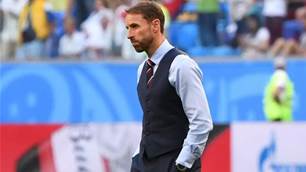Steve McClaren made his exit from English football derided as the 'Wally with the Brolly' after his brief and disastrous reign over the national team was mercifully brought to an end.
The credentials McClaren had worked so hard to hone in the course of his coaching career were swept aside by the sheer force of statistics which labelled him the worst England boss of all time.
No matter that McClaren's club record spoke only of success, both as an assistant at Derby and Manchester United and his spell at Middlesbrough which brought them their highest ever league position and a place in the UEFA Cup final.
McClaren's naivety when it came to the enormity of the England role was at times excruciating to watch, to the extent that it was no surprise there were few clubs queuing up to have him back.
When Dutch club FC Twente took the plunge, McClaren's bumbling public persona took another battering when he was recorded speaking English with a mock Dutch accent in a television interview.
But McClaren has proved nothing if not resilient.
Silencing those critics who continued to line up to mock his every move, he now stands on the brink of the sort of success of which most of his contemporaries can only dream.
Having led the club to second place in the Eredivisie last season behind surprise champions AZ Alkmaar, McClaren is now one game away from claiming Twente's first ever league title.
Victory over NAC Breda at the weekend will allow the club from close to the German border, whose resources pale into insignificance against those of their closest rivals Ajax, to celebrate a remarkable triumph.
McClaren said recently his experience with England had helped him.
"I'm not frightened of failure any more, because after the failure with England I've seen the ultimate," he said.
Perhaps an even bigger surprise than McClaren's resurgence is the fact that an Eredivisie title will provide an English manager with a first continental title since Sir Bobby Robson with Porto in 1996.
This week, speaking on BBC Radio Five Live, another former England manager, Graham Taylor, praised McClaren's bravery and expressed bewilderment that so few other English bosses have sought a European road to redemption.
Robson was one of the exceptions, following his more successful role as national coach with spells in Holland, Portugal and Spain, where titles were won with Barcelona and plaudits heaped upon him by some of the finest players in the game.
Meanwhile, Roy Hodgson's startling recent success with Fulham ought to serve as a potent example to young managers of the benefits of learning their trade away from the often excruciatingly bright spotlight at home.
Hodgson won Swedish league titles with Halmstad and Malmo, took Switzerland to the 1994 World Cup and Inter Milan to a UEFA Cup final. Yet he still found himself judged by a difficult season in charge of Blackburn.
Following his exploits at Craven Cottage, few now would argue that Hodgson is not one of the finest managers in the European game, and he would concede that success has come as a result of his varied experience.
McClaren was brave enough to follow those sterling examples. He sought advice from Robson, who told him: "You'll love it."
After his initial interview setback, he set about rebuilding both himself and his club away from the spotlight.
Signings like Miroslav Stoch, on loan from Chelsea, and in-form Costa Rican Bryan Ruiz, who has scored 23 goals this season so far, showed McClaren had lost none of his astuteness in the transfer market.
And while he has kept his name out of the headlines in England at least, his success has inevitably pricked up a few ears of interest, with his name being mentioned in association with a potential vacancy at West Ham.
Few could blame McClaren if he turned his back for good on the nation which made a mockery of his reputation.
Victory over NAC Breda will give him all the vindication he needs and ensures Steve McClaren is a wally with a brolly no more.
No matter that McClaren's club record spoke only of success, both as an assistant at Derby and Manchester United and his spell at Middlesbrough which brought them their highest ever league position and a place in the UEFA Cup final.
McClaren's naivety when it came to the enormity of the England role was at times excruciating to watch, to the extent that it was no surprise there were few clubs queuing up to have him back.
When Dutch club FC Twente took the plunge, McClaren's bumbling public persona took another battering when he was recorded speaking English with a mock Dutch accent in a television interview.
But McClaren has proved nothing if not resilient.
Silencing those critics who continued to line up to mock his every move, he now stands on the brink of the sort of success of which most of his contemporaries can only dream.
Having led the club to second place in the Eredivisie last season behind surprise champions AZ Alkmaar, McClaren is now one game away from claiming Twente's first ever league title.
Victory over NAC Breda at the weekend will allow the club from close to the German border, whose resources pale into insignificance against those of their closest rivals Ajax, to celebrate a remarkable triumph.
McClaren said recently his experience with England had helped him.
"I'm not frightened of failure any more, because after the failure with England I've seen the ultimate," he said.
Perhaps an even bigger surprise than McClaren's resurgence is the fact that an Eredivisie title will provide an English manager with a first continental title since Sir Bobby Robson with Porto in 1996.
This week, speaking on BBC Radio Five Live, another former England manager, Graham Taylor, praised McClaren's bravery and expressed bewilderment that so few other English bosses have sought a European road to redemption.
Robson was one of the exceptions, following his more successful role as national coach with spells in Holland, Portugal and Spain, where titles were won with Barcelona and plaudits heaped upon him by some of the finest players in the game.
Meanwhile, Roy Hodgson's startling recent success with Fulham ought to serve as a potent example to young managers of the benefits of learning their trade away from the often excruciatingly bright spotlight at home.
Hodgson won Swedish league titles with Halmstad and Malmo, took Switzerland to the 1994 World Cup and Inter Milan to a UEFA Cup final. Yet he still found himself judged by a difficult season in charge of Blackburn.
Following his exploits at Craven Cottage, few now would argue that Hodgson is not one of the finest managers in the European game, and he would concede that success has come as a result of his varied experience.
McClaren was brave enough to follow those sterling examples. He sought advice from Robson, who told him: "You'll love it."
After his initial interview setback, he set about rebuilding both himself and his club away from the spotlight.
Signings like Miroslav Stoch, on loan from Chelsea, and in-form Costa Rican Bryan Ruiz, who has scored 23 goals this season so far, showed McClaren had lost none of his astuteness in the transfer market.
And while he has kept his name out of the headlines in England at least, his success has inevitably pricked up a few ears of interest, with his name being mentioned in association with a potential vacancy at West Ham.
Few could blame McClaren if he turned his back for good on the nation which made a mockery of his reputation.
Victory over NAC Breda will give him all the vindication he needs and ensures Steve McClaren is a wally with a brolly no more.
Copyright (c) Press Association
Related Articles

World Cup favourites England have one gaping question left to answer

Rampant England reach Women's Euros final













